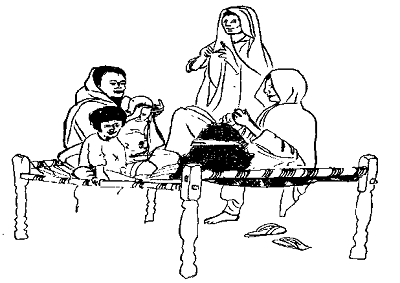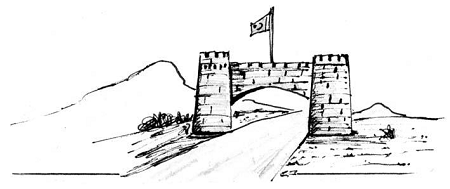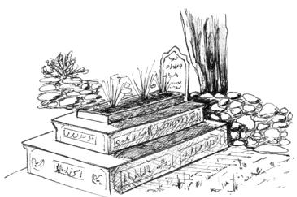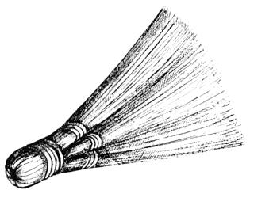Lesson Eighteen
Dialogue eighteen: Questions about relatives
L: haghá de tsu day? What relation is he to you? | هغه دې څهٔ دے؟ |
H: tru me day. He is my uncle. | ترۀ مې دے. |
L: tru tsu ta waayee? What does uncle mean? | ترۀ څۀ ته وائى؟ |
H: tru du plaar wroor ta waayee. Uncle means father's brother. | ترۀ د پلار ورور ته وائى. |
L: tu du haghé tsu kege? What are you to her? | تۀ د هغې څۀ کېږې؟ |
H: zu du haghé khor yum. I am her sister. | زۀ د هغې خور يم. |
L: haghú ta tsu noom aakhle? What do you call him? | هغۀ ته څۀ نُوم اخلې؟ |
H: zu haghú ta khaan jee waayum. I call him hanji. | زۀ هغۀ ته خان جى وايم. |
L: zu wăr-ta tsu oowaayum? What should I call him? | زۀ ورته څۀ ووايم؟ |
H: tu wăr-ta kaakaa jee oowaaya. Yu should all him 'Uncle Sir'. | تۀ ورته کاکا جى ووايه. |
H: tarbóor me day. H's my couin. | تربُور مې دے. |
L: daa staa saká du tru zooy day? Is he your real first cousin? | دا ستا سکه د ترۀ زوئ دے؟ |
H: aaw, saká du tru zooy me day. Yes, he is my real first cousin. | آو، سکه د ترۀ زوئ مې دے. |
L: taa na mushur day ku kushur? Is he older or younger than you? | تا نه مشر دے کۀ کشر؟ |
H: zmaa humzólay day. He is the same age as me. | زما همزولے دے. |
NOTE:
Coming to grips with how families and relatives fit together is an important part of understanding Pukhtun culture. A useful introduction to family life is the anthropological study of Swat Pukhtuns by Charles Lindholm.
Kinship terms
Paternal kinship chart

NOTE:
ترهٔ زوئ - tru zooy is also called تربُور - tarbóor; and ترهٔ لُور - tru loor may be ترله - turlá.
In learning kinship terms it is a good idea to first ask what relationship someone is to your friend. After the reply see if you can correctly say what the reverse relationship is. The conversation might go like this:
| haghá de tsu day? | What's he to you? | هغه دې څۀ دے؟ |
| tru me day. | He's my uncle. | ترۀ مې دے. |
| no tu du haghú wraarú ye? | So you're his nephew? | نو تۀ د هغۀ ورارۀ ېې؟ |
Maternal Kinship chart


Kinship between inlaws
YOU represents a male in this chart

YOU representes a femaile in this chart

Practicing kinship names
You might be wondering how to learn all these new kinship terms. One idea is to put together a collection of your own family pictures and develop a dialogue about each family member. Be aware that it is not appropriate for men to show pictures of females to Pukhtun men, so some creativity may be needed to avoid offense.
Pronunciation drill
Focus on ق - q by practicing tongue twisters:

The past tense
Before starting the past tense it is helpful to be clear on the distinction between transitive and intransitive verbs. They operate in very different ways. Transitive verbs involve action on an object (he ate an apple, she hit me, etc.). Intransitive verbs have no object (I was walking, he was asleep, etc.). (See Lessons Seven and Eight.)
The simple past tense of the equative (’to be’) verb
| Person | Singular | Plural |
|---|---|---|
1st | wum I was وم | woo We were وُو |
2nd | we you were وې | wey you were وئ |
3rd m. | wo he was وو | woo they were وُو |
3rd f. | wa she was وه | we they were وې |
NOTE:
The 2nd person singular and 3rd person feminine plural are slightly different in pronunciation. (IS THIS TRUE? RECHECK)
👆 Ask your helper to teach you this difference.
Examples of the past tense “to be” verb in sentences
| zu DakTúr wum. | I was a doctor. | زۀ ډاکټر وم. |
| moong Der khaawgu dostáan woo. | We were very sweet friends. | مُونږ ډېر خواږۀ دوستان وُو. |
| tu khu halúk we? | Were you a good boy? | تۀ ښۀ هلک وې؟ |
| táaso khufa nu wey? | Weren't you upset? | تاسو خفه نۀ وئ؟ |
| haghá Der naráy wo. | He was very skinny. | هغه ډېر نرے وو. |
| daa naajóRa wa. | She was sick. | دا ناجوړه وه. |
| haghá Der khoshaala wo. | He was very happy. | هغه ډېر خوشحاله وو. |
| haghwee Dere khkUle we. | They were very pretty. (f.pl.) | هغوى ډېرې ښکُلې وې. |
| hágha khu filum nu wo. | That was not a good film. (m.s.) | هغه ښۀ فلم نۀ وو. |
| hágha khu kitaabóona woo. | Those were good books. (m.pl.) | هغه ښۀ کتابونه وُو. |
| hágha kha qeesá wa. | That was a good story. (f.s.) | هغه ښه قيصه وه. |
| hágha khe qeesé we. | Those were good stories. (f.pl.) | هغه ښې قيصې وې. |
| rahmaan baabaa Der looy shaa'ir wo. | Rahman Baba was a great poet. (m.s.) | رحمان بابا ډېر لوئ شاعر وو. |
NOTE:
The bookish form of the 3rd person masculine plural is ول - wul, but it is not used in normal speech.
Adverbs of time used in the past tense
| haghá pukhwaa tsunga kaareegúr wo? | What kind of worker was he before? | هغه پخوا څنګه کاريګر وو؟ |
| haghá Der mihnatée wo. | He was very hard working. | هغه ډېر مِحنتى وو. |
| begáa staa khor tsunga wa? | How was your sister last night? | بېګا ستا خور څنګه وه؟ |
| téra myaasht ke tu chărta we? | Where were you last month? | تېره مياشت کښې تۀ چرته وې؟ |
| ze pu swaat ke wum. | I was in Swat. | زۀ په سوات کښې وم. |
| pu téra haftá ke staa zaamun chărta woo? | Where were your sons last week? | په تېره هفته کښې ستا زامن چرته وُو؟ |
| pu téra haftá ke pu hangóo ke woo. | They were in Hangu last week. | په تېره هفته کښې په هنګُو کښې وُو. |
| khúze paróon pu kor ke we? | Were the women at home yesterday? | ښځې پرُون په کور کښې وې؟ |
| na, haghwée nu we, du gaawunDiyaano pu kor ke we. | No, they were not, they were at the neighbours' house. | نه، هغوى نۀ وې، د ګاونډيانو په کور کښې وې. |
| parosakaal tu chărta we? | Where were you last year? | پروسکال ته چرته وې؟ |
NOTE:
The adjective تېر - ter is used to modify the time words that point to the past and like other adjectives it is inflected for number and gender.
The verb کېدل - kedúl (to become) in the simple past tense
As we saw in earlier lessons, the auxillary verb کېدل - kedul is irregular and it's perfective aspect forms always start with شـ - sh--. (They are based on the perfective root of کېدل - kedúl (to become), which is شول - shwul.)
Conjugation of the simple past tense of کېدل - kedul (to become)
| singular | plural | |
|---|---|---|
1st | shwum شوم | shoo شُو |
2nd | shwe شوې | shwey شُوئ |
3rd m. | sho شو | shoo شُو |
3rd f. | shwa شوه | shwe شوې |
NOTE:
There is also a bookish form of the 3rd person simple past: شول - shwul.
Examples of the verb کېدل - kedul (to become) used in the simple past.
| haghwée moong to ghUsa shoo? | Did they become angry with us? | هغوى مُونږ ته غُصه شُو؟ |
| na, ghUsa nu shoo. | No they didn't become angry. | نه، غُصه نۀ شُو. |
| tu kala khog shwe? | When did you get injured? | تۀ کله خوږ شوې؟ |
| zu yuwa haftá makhke khog shwum. | I got injured a week ago. | زۀ يوه هفته مخکښې خوږ شوم. |
| tsu óoshoo? wăle jeenakúy doomra khosháala shwe? | What happened? Why have the girls become so happy? | څۀ وشُو؟ ولې جينکۍ دومره خوشحاله شوې؟ |
| zuka che nateejá óowata aw dwee paas shwe. | Because their results came out and they passed. | ځکه چې نتيجه ووته او دوئ پاس شوې. |
| tu begáa tsu wakht oodú shwe? | When did you go to sleep last night? | ته بېګا څۀ وخت اُودۀ شوې؟ |
| zu lus néme bajé oodú shwum. | I went to sleep at ten-thirty. | زۀ لس نيمې بجې اُودۀ شوم. |
| du khUdaay pu fázul sara kaar khatum sho. | By the grace of God the job is finished. | د خُدائ په فضل سره کار ختم شو. |
NOTE:
If you are British, take care with words like بېګا - begáa that end in a long ا - aa sound. It is a common mistake to add an ر - r sound to the end of the word.
IMPORTANT NOTE:
This verb کېدل - kedul (to become ) is not to be confused with it's twin, کېدل - kedul (to happen)! These verbs look the same, but the behave differently and mean different things. The perfective forms (like the subjunctive and simple past) of کېدل - kedul (to become) always start with شـ - sh-- while the perfective forms of کېدل - kedul (to happen) always start with وشـ - oosh--.
Look again at an example from above. The first sentence uses کېدل - kedúl (to happen) and so the simple past tense starts with وشـ - oosh--. The second sentence uses کېدل - kedúl (to become) and the simple past tense starts with شـ - sh--
| tsu óoshoo? wăle jeenakúy doomra khosháala shwe? | What happened? Why have the girls become so happy? | څۀ وشُو؟ ولې جينکۍ دومره خوشحاله شوې؟ |
The passive voice in the simple past tense
Earlier we learned that we can put transitive verbs in the passive voice by using کېدل - kedul (to become) with the infinitive. For example, with the transitive verb وینځل - weenzul (to wash)
| zu khpul qamées weenzum. | I am washing my shirt. | زه خپل قمیض وینځم. |
| zmaa qamées weenzulay kegee. | My shirt is being washed. (Present passive) | زما قمیص وینځلے کېږی. |
To say these kinds of passive sentences in their simple past form, we have to change the کېدل - kedúl to its simple past form, and use the perfective root instead of the infinitive (for regular verbs, add a و - oo / w to the front of the infinitive).
| zmaa qamées óoweenzulay sho. | My shirt was washed. (Simple past passive) | زما قمیص ووینځلے شو. |
Examples of the passive voice in simple past
| zmaa qamáas nun óoweenzulay sho? | Was my shirt washed today? | زما قميص نن ووينځلے شو؟ |
| na, oo-nu-weenzulay sho. | No, it was not washed. | نه، ونهٔ وینځلے شو. |
| khatóona mU oo-nu-legulee shoo? | Were your letters not sent? | خطُونه مو ونۀ لېږلی شُو؟ |
| aw, óolegulee shoo. | Yes, they were sent. | آو، ولېږلی شُو. |
| DoDuy tsu wakht óokhoRule shwa? | When was the food eaten? | ډوډۍ څۀ وخت وخوړلې شوه؟ |
| sahár wakhtee óokhoRule shwa. | It was eaten early this morning. | سحر وختى وخوړلې شوه. |
| zu paróon óowahulay shwum. | I (male) was hit yesterday. | زهٔ پرُون ووهلے شوم. |
| tu begáa óoleeday shwe? | Were you (male) seen last night? | تۀ بېګا وليدے شوې؟ |
| na, maa Der ihtiyáat kawó | No, I was very careful. (not passive) | نه، ما ډېر اِحتياط کوو. |
| filmóona ookatulee shwul? | Were the films watched? | فلمُونه وکتلی شول؟ |
| na, bijlee nu wa. | No, there was no electricity. | نه، بجلى نۀ وه. |
NOTE:
For all the passive sentences above, the verb agrees with the subject, because there is no object. Later we will see that when there are active transitive verbs with an object, the verb will agree with the object in the past tense. This is part of what’s called “ergativity.”
Intransitive compounds in the simple past tense
Compounds with کېدل - kedul (to became) in the simple past tense
Intransitive compounds made with nouns
| paróon baaraan tsu wakht shUróo sho? | When did the rain start yesterday? | پرُون باران څۀ وخت شروع شو؟ |
| taqreebán aatu baje shUróo sho. | It started about eight o'clock. | تقريباً اتۀ بجې شروع شو. |
| qameesóona me istree shoo? | Were my shirts ironed? | قميصُونه مې اِسترى شُو؟ |
| na, istree nu shoo. | No, they were not ironed. | نه، اِسترى نۀ شُو. |
| daa peghla kala waadu shwa? | When did this girl get married? | دا پېغله کله وادۀ شوه؟ |
| yuwa hafta makhke waadú shwa. | She got married a week ago. | يوه هفته مخکښې وادۀ شوه. |
| kamre jaaróo shwe? | Were the rooms swept? | کمرې جارُو شوې؟ |
| aw, sahar jaaróo shwe. | Yes, they were swept this morning. | آو، سحر جارُو شوې. |
Intransitive compounds made with adjectives
| staa moTúr kala kharts sho? | When was your car sold? | ستا موټر کله خرڅ شو؟ |
| yuwa myaasht makhke kharts sho. | It was sold a month earlier. | يوه مياشت مخکښې خرڅ شو. |
| ghunúm tsu wakht laamdú shoo? | When did the wheat become wet? (m.pl.) | غنم څۀ وخت لامدۀ شُو؟ |
| begáa laamdú shoo. | It became wet last night. | بېګا لامدۀ شُو. |
| pu waRóokee halúk tsu óosho? | What happened to the small boy? | په وړُوکى هلک څۀ وشُو؟ |
Note: The above sentence uses a different word کېدل - kedúl (to happen) so the simple past tense form looks different and begins with وشـ - oosh--.
| du aajúz khpa maata shwa. | The poor boy's foot was broken. (f.s.) | د عاجز پښه ما ته شوه. |
| kUrsúy de kala jóRe shwe? | When were your chairs made? (f.pl.) | کُرسۍ دې کله جوړې شوې؟ |
| drewruze makhke jóRe shwe. | They were made three days ago. | درې ورځې مخکښې جوړې شوې. |
NOTE:
The verbal adjectives are also inflected according to the number and gender of the subject. See the following examples:
| Got Wet | Got Dry | |
|---|---|---|
m. s. | loond sho لوند شو | ooch sho اوچ شو |
m. pl. | laamdú shoo لامدهٔ شُو | ooch shoo اوچ شُو |
f. s. | lamdá shwa, landá shwa لمده شوه / لنده شوه | oocha shwa اوچه شوه |
f. pl. | lamdé shwe لمدې شوې | ooche shwe اوچې شوې |
| Got Cooked/Ripe | Died (became dead) | |
|---|---|---|
m. s. | pokh sho بوخ شو | muR sho مړ شو |
m. pl. | paakhú shoo پاخهٔ شُو | mRu shoo مړهٔ شُو |
f. s. | pakhá shwa پخه شوه | mRa shwa مړه شوه |
f. pl. | pakhé shwe پخې شوې | mRe shwe مړې شوې |
| churg tsu wakht pokh sho? | When was the chicken cooked? (m.s.) | چرګ څۀ وخت پوخ شو؟ |
| churgáan tsu wakht paakhú shoo? | When were the chickens cooked? (m.pl.) | چرګان څۀ وخت پاخۀ شُو؟ |
| DoDúy tsu wakht pakhá shwa? | When was the bread cooked? (f.s.) | ډوډۍ څۀ وخت پخه شوه؟ |
| wréjze tsu wakht pakhé shwe? | When was the rice cooked? (f.pl.) | ورېژې څۀ وخت پخې شوې؟ |
| yo saRay nun muR sho. | A man died today. (m.s.) | يو سړے نن مړ شو. |
| dre saRee nun mRu shoo. | Three men died today. (m.pl.) | درې سړى نن مړۀ شُو. |
| yuwa khuza nun mRa shwa. | One woman died today. (f.s.) | يوه ښځه نن مړۀ شوه. |
| dre khuze nun mRe shwe. | Three women died today. (f.pl.) | درې ښځې نن مړې شوې. |

Comprehension drill: Inquiring about the time
| tso baje dee? | What time is it? | څو بجې دى؟ |
| tsalor baje dee. | It's four o'clock. | څلور بجې دى. |
| staa pu gaRúy ke tso baje dee? | What's the time on your watch? | ستا په ګړۍ کښې څو بجې دى؟ |
| dólus baje dee. | It's twelve o'clock. | دولس بجې دى. |
| tsu wakht day? | What time is it? | څۀ وخت دے؟ |
| shpug neeme baje deee. | It's six thirty. | شپږ نيمې بجې دى. |
| tsu wakht day? | What time is it? | څۀ وخت دے؟ |
| paaw kam peenzu baje dee. | It is quarter to five. | پاؤ کم پينځۀ بجې دى. |
| tsu wakht day? | What time is it? | څۀ وخت دے؟ |
| paaw baande dolus baje dee. | It is a quarter past twelve. | پاؤ باندې دولس بجې دى. |
| lus minTa kam tsalór dee. | It is ten minutes to four. | لس منټه کم څلور بجې دى. |
| shil du paasa peenzu baje dee. (yaa)shil minTa du paasa peenzú baje dee. | It's twenty past five. | شل د پاسه پينځۀ بجې دى. (یا)شل منټه د پاسه پينځۀ بجې دى. |
| tsu wakht day? | What time is it? | څۀ وخت دے؟ |
| yuwá baja da. | It's one o'clock. | يوه بجه ده. |
NOTE:
Remember to pay attention to the gender of “one” یو - yo / یوه - yuwá
👆 Use a clock or watch to practice asking or telling the time with your helper.
Memorising moment
mataloona
Exercises for Lesson Eighteen
Change the following present tense questions into their simple past tense forms and answer the questions.
